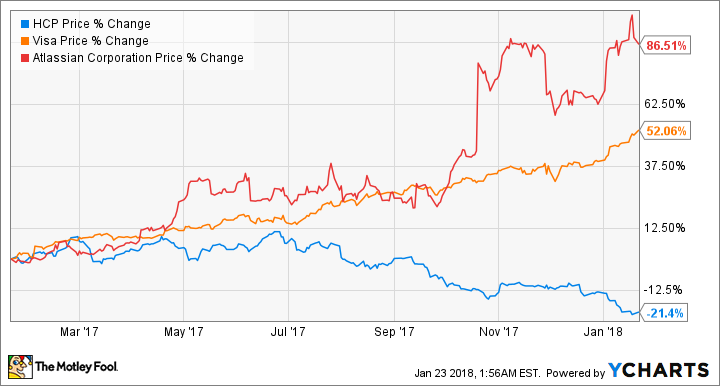3 Growth Stocks for Forward-Looking Investors
Investing in growth stocks says a lot about your personal view of the future and the companies that fit the trends you envision in that future: an aging population that will require more healthcare, a shift toward no longer carrying cash in your wallet, or even offices becoming a thing of the past as employees use communication platforms and applications for work.
If any of these trends sound like something you foresee happening in your investing time horizon, you should take a look at shares of HCP (NYSE: HCP), Visa (NYSE: V), and Atlassian (NASDAQ: TEAM). Here's why these Motley Fool investors think these are the growth stocks to watch.

Image source: Getty Images.
Invest in America's aging population
Matt Frankel (HCP): Healthcare real estate investment trust HCP may not seem like a great stock to buy right now. After all, it just finished spinning off its troubled assets and deleveraging its balance sheet, which caused it to cut its dividend, breaking a quarter-century streak of dividend increases.
Real estate has also significantly underperformed the market lately, with HCP doing worse than most. The S&P 500 has risen by more than 22% over the past year, while HCP has dropped by the same amount.
Having said that, there are plenty of reasons to invest in the "new and improved" HCP. For starters, the spinoff and other refocusing moves are good things from a long-term perspective. The company now has a narrowed focus on just three core property types (senior housing, life science, and medical offices), and 95% of its properties now derive their revenue from stable, private-pay sources.
It's also worth mentioning that HCP still pays a massive 6.1% dividend yield, and now it's based on stable and sustainable revenue growth. I'll take that any day over a higher dividend backed by lower-quality properties.
Finally -- and this is where the "forward-looking" part comes in -- the long-term demographic trends are especially positive for HCP's core property types. Specifically, the U.S. population is aging fast, which should be a major catalyst for senior housing and medical offices and to life science properties in a more indirect way. For example, from the 2020-2030 period alone, the 75-and-older population is expected to grow by 50%.
So, while there may be short-term headwinds, such as rising interest rates, keeping its share price down, the long-term outlook for HCP is nothing but positive.
The switch to a cashless society is just getting started
Tyler Crowe (Visa): I'm guessing that more and more of your personal transactions involve using noncash methods. Either a credit or debit card or even direct payments with platforms like PayPal. According to the most recent whitepaper from Mastercard Advisors, about 45% of all transactions in the U.S. don't involve cash. That study was back in 2014, though, so chances are that number has increased a bit in recent years. That is a relatively high rate of penetration for cashless transactions, but it's important to consider that the shift is a global phenomenon. Comparatively, the U.S. is pretty far along in the shift to cash. Those countries further down the ladder are what really count.
Consider this: Today, there are about $17 trillion in global transactions that involve either cash or a check. In China and India -- about 35% of the global population -- cash is used in more than 90% of all transactions. That also doesn't include other markets such as the Middle East and Africa, where cashless transaction penetration is even lower. With so much of the world running on cash, there's still a massive market for Visa to disrupt.
On top of the traditional market for cashless transactions -- like retail payments and personal expenses -- Visa is hunting for even bigger ones, namely business-to-business and government-to-customer transactions. According to the company, it can seize a $30 trillion share in these markets.
The credit card business is an extremely lucrative one with limited competition and very high barriers to entry. With the world's largest network of merchants accepting Visa, it has a leg up on its competition in many emerging markets where growth is the fastest. While shares may look pricey today -- 42 times earnings -- investors will want to hang on to Visa stock for a long, long time.
A fast-growing giant
Maxx Chatsko (Atlassian): Most companies sporting a market cap north of $10 billion aren't capable of delivering year-over-year revenue growth of 40%, but Atlassian is not most companies. The business communication and collaboration software leader owns a commanding share of a quickly growing market that is expected to hit $28 billion by 2020, up from just $15 billion in 2016. In other words, eye-popping growth could continue for the foreseeable future.
While Atlassian has doubled down on revenue growth in lieu of achieving profitable operations, there hasn't been much for shareholders to complain about. Wall Street seems more than happy to go along with the strategy, as demonstrated by the stock's 89% gain in 2017.
A series of growth-minded acquisitions, the launch of new products, and continued investments in its own app market -- in which developers can create and share custom software solutions that stack on core features -- have presented ample opportunities for the company to generate subscription, maintenance, and perpetual license revenue. In fact, subscriptions became the top revenue category for the first time ever in the most recent quarter. That's a great sign that the platforms are gaining traction, which should extend sustainable long-term benefits to shareholders.
Of course, a deteriorating bottom line isn't exactly ideal. But Atlassian should be able to return to profitable operations relatively quickly if it absolutely needed to, and the business generates remarkable amounts of cash flow despite mounting losses. Considering the industry is poised for years of expansion, this remains a solid growth stock for forward-looking investors.
More From The Motley Fool
Matthew Frankel owns shares of HCP. Maxx Chatsko has no position in any of the stocks mentioned. Tyler Crowe owns shares of HCP and Visa. The Motley Fool owns shares of and recommends Atlassian and Visa. The Motley Fool has a disclosure policy.

 Yahoo Finance
Yahoo Finance 
